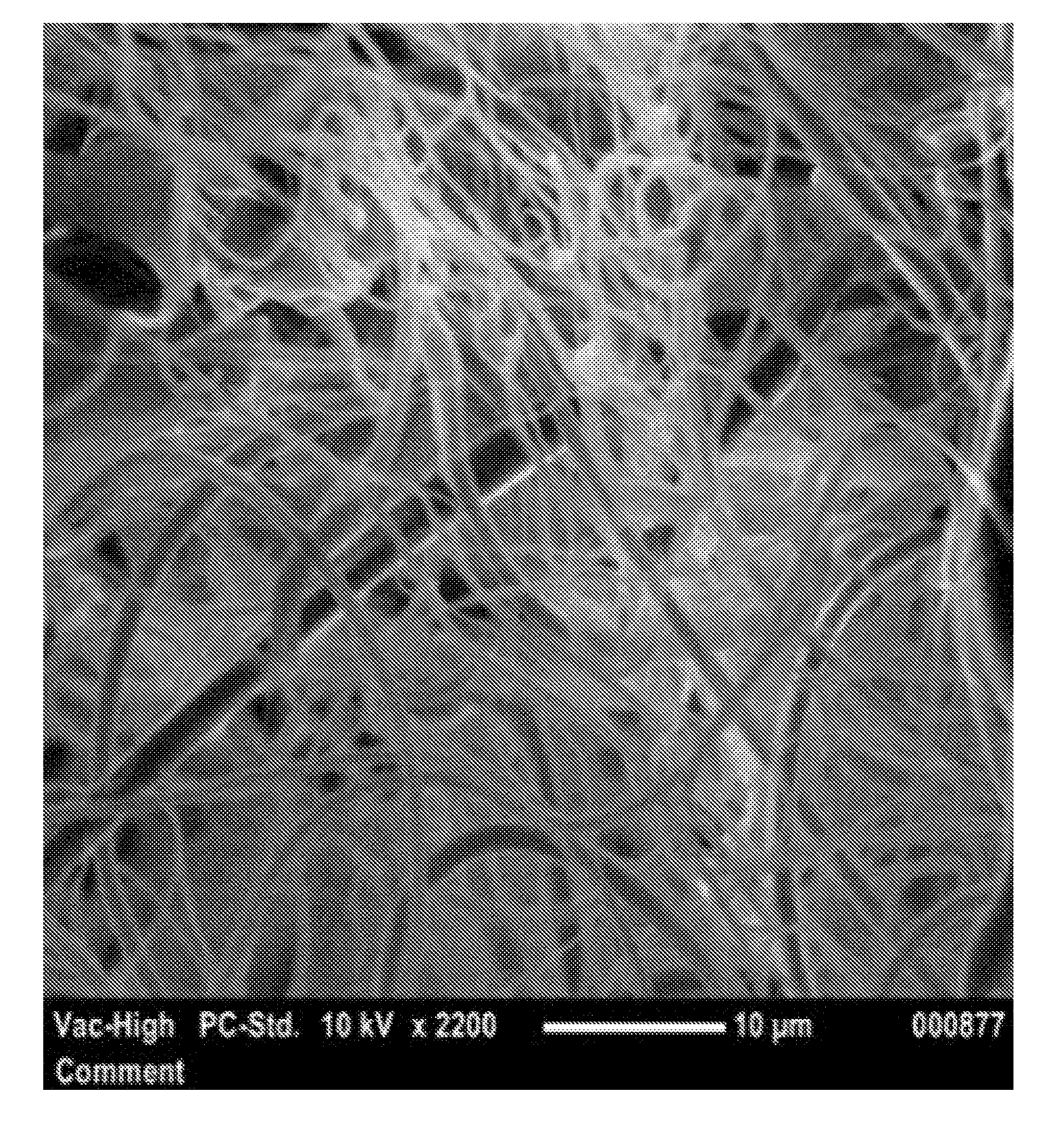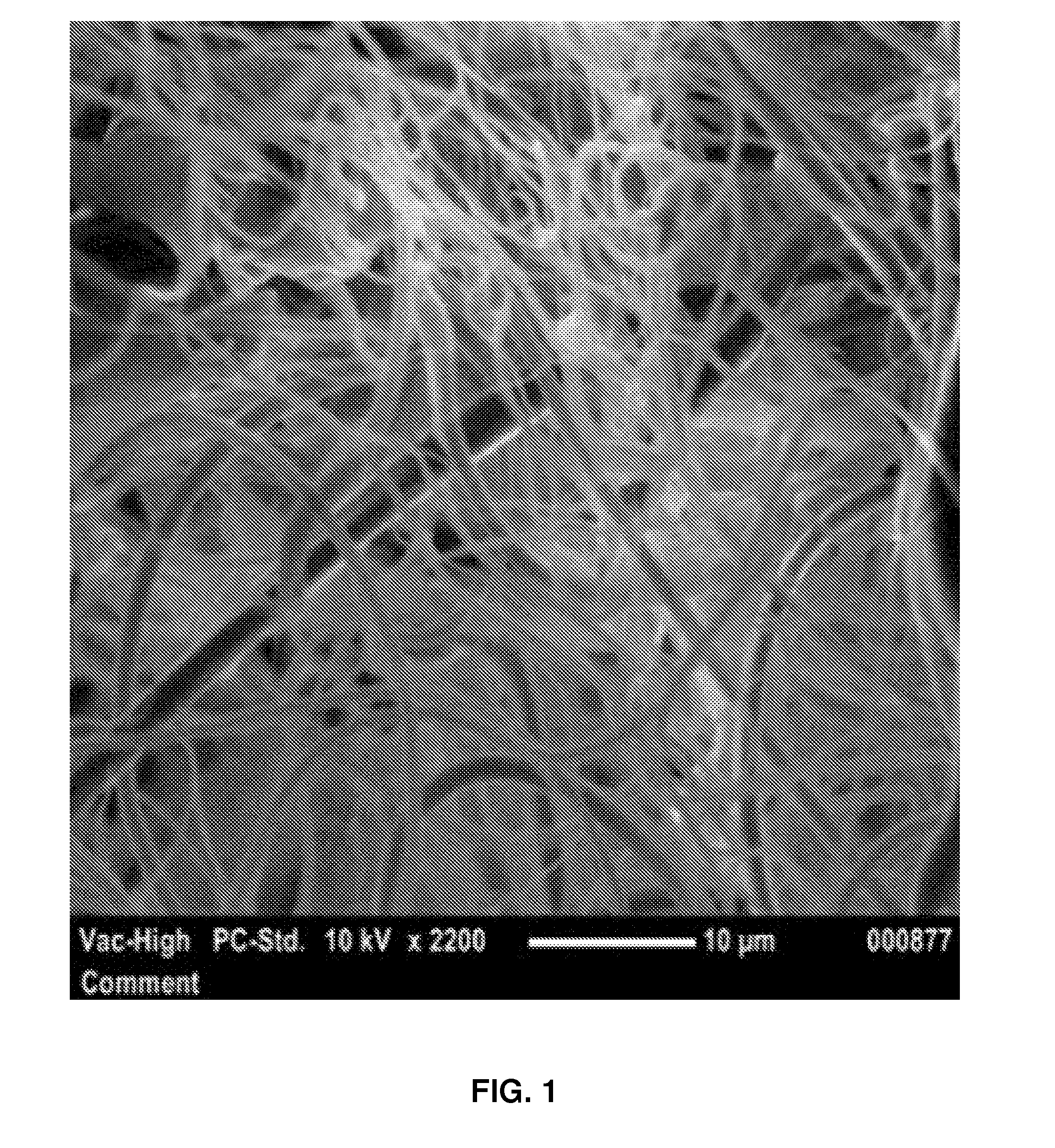Shear spun sub-micrometer fibers
a technology of sub-micrometer fibers and spun fibers, applied in the direction of textiles and paper, filament/thread forming, non-woven fabrics, etc., can solve problems such as inacceptable methods
- Summary
- Abstract
- Description
- Claims
- Application Information
AI Technical Summary
Benefits of technology
Problems solved by technology
Method used
Image
Examples
examples 1-5
[0076]Several variations of PEI resins were solution spun to average fiber diameters in the sub-micrometer range. FIG. 1 is an exemplary image of the fibers obtained. Table 1 provides a list of materials employed in Examples 1-5.
TABLE 1ComponentChemical DescriptionSourcePEIpolyetherimideULTEM(TM), SABICGlycerolGlycerol (99.7%)Brenntag Southwest, Inc.EthanolEthanol (Anhydrous ACS / USPPharmaco-Aapergrade, 99.5%)ChloroformChloroform (99+%, extra pure,Acros Organicsstabilized with ethanol)
[0077]Distributions of fiber diameters were measured by imaging the sample using a scanning electron microscope (SEM) (e.g., Phenom Pro Desktop SEM). A minimum magnification of 140× was used. A minimum of 4 images are retained for fiber diameter analysis. Fiber diameter analysis software (e.g., Fibermetric software) is used to measure the sample's images and at least 50 measurements per image, which are randomly selected by the software, are used in determining the average fiber diameter and distributio...
example 1
[0078]A solution (first dispersion medium) comprising of 15% ULTEM™ 1010 polyetherimide dissolved in chloroform, with a solution viscosity of about 500 cP, was injected into an anti-solvent (second dispersion medium) comprised of about 60% glycerol, about 25% ethanol and about 15% water flowing at a rate of 5 ml / min. This sample was produced using a Xanofi Xanoshear™ spinning system. The example resulted in fibers with a diameter between 165 nm and 9.5 pm with an average diameter of 3.7 μm. FIG. 3A represents the fiber morphology of the sample. FIG. 3B is a histogram of the fiber diameter measurements taken.
example 2
[0079]A solution (first dispersion medium) comprising of 15% ULTEM™1010 polyetherimide dissolved in chloroform, with a solution viscosity of about 500 cP, was injected into an anti-solvent (second dispersion medium) comprised of about 70% glycerol, about 17.5% ethanol and about 12.5% water flowing at a rate of 15 ml / min. This sample was produced using a Xanofi Xanoshear™ spinning system. The example resulted in fibers with a diameter between 400 nm and 5.8 μm with an average diameter of 2.1 μm. FIG. 4A represents the fiber morphology of the sample. FIG. 4B is a histogram of the fiber diameter measurements taken.
PUM
| Property | Measurement | Unit |
|---|---|---|
| diameter | aaaaa | aaaaa |
| width | aaaaa | aaaaa |
| viscosity | aaaaa | aaaaa |
Abstract
Description
Claims
Application Information
 Login to View More
Login to View More - R&D
- Intellectual Property
- Life Sciences
- Materials
- Tech Scout
- Unparalleled Data Quality
- Higher Quality Content
- 60% Fewer Hallucinations
Browse by: Latest US Patents, China's latest patents, Technical Efficacy Thesaurus, Application Domain, Technology Topic, Popular Technical Reports.
© 2025 PatSnap. All rights reserved.Legal|Privacy policy|Modern Slavery Act Transparency Statement|Sitemap|About US| Contact US: help@patsnap.com



